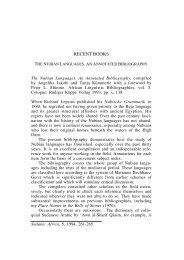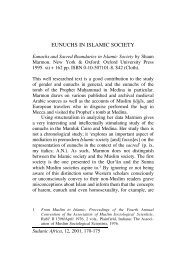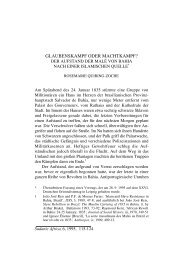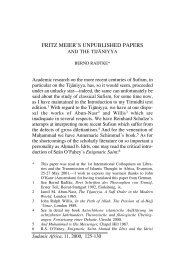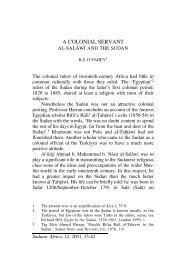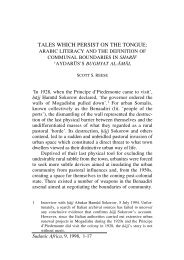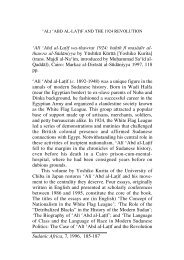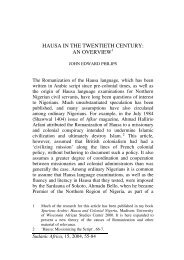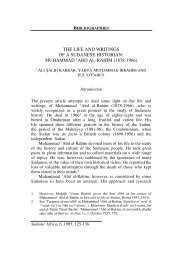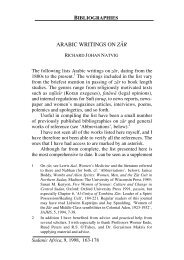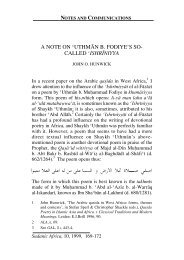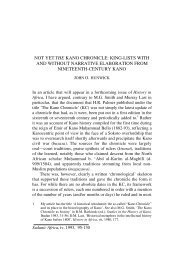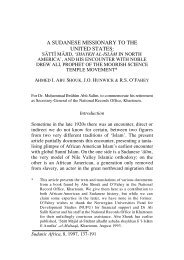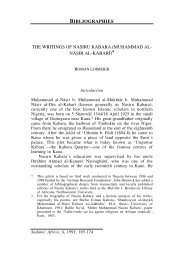642 Ziba Mir-Hosseini / <strong>Between</strong> <strong>Islamic</strong> <strong>Law</strong> <strong>and</strong> Feminismabeth Cady Stanton placed the dem<strong>and</strong> <strong>for</strong> equal rights <strong>for</strong> women squarelywithin a religious framework <strong>and</strong> went as far as writing The Women’s Bible(1895). These became part of new political <strong>and</strong> socioeconomic discoursesthat were shaped by new social conditions <strong>and</strong> in turn shaped new underst<strong>and</strong>ingsof sacred texts <strong>and</strong> a woman’s situation in the West. 21The work of the <strong>Islamic</strong> feminists should be examined in this light. Byboth uncovering a hidden history <strong>and</strong> rereading textual sources, they areproving that the inequalities embedded in fiqh are neither manifestationsof divine will nor cornerstones of an irredeemably backward social system;rather, they are human constructions. They are also showing how such unequalconstructions contradict the very essence of divine justice as revealedin the Koran <strong>and</strong> how Islam’s sacred texts have been taintedbytheideologiesof their interpreters. 22 For example, they show how men’s unilateral rightsto divorce (talaq) <strong>and</strong> polygyny were not granted to them by God but by<strong>Muslim</strong> male jurists. These are juristic constructs that follow from the waythat early <strong>Muslim</strong> jurists conceptualized <strong>and</strong> defined marriage.The majority of these feminist scholars have focused their energy on thefield of Koranic interpretation (tafsir) <strong>and</strong> have successfully uncovered theKoran’s egalitarian message. The genesis of gender inequality in <strong>Islamic</strong> legaltradition, these scholars tell us, lies in the cultural norms of early<strong>Muslim</strong>societies. 23 While the ideals of Islam call <strong>for</strong> freedom, justice, <strong>and</strong> equality,<strong>Muslim</strong> norms <strong>and</strong> social structures in the <strong>for</strong>mative years of <strong>Islamic</strong> law21. Given the centrality of law in Judaism, there are interesting parallels <strong>and</strong> differences in theways in which <strong>Muslim</strong> <strong>and</strong> Jewish feminists deal with patriarchal laws legitimated throughreligious tradition. On Jewish feminism, see On Being a Jewish Feminist, ed. Susannah Heschel(New York, 1995).22. In addition to works mentioned in note 19, see Azizah Al-Hibri, “Islam, <strong>Law</strong>, <strong>and</strong> Custom:Redefining <strong>Muslim</strong> Women’s Rights,” American University Journal of International <strong>Law</strong> <strong>and</strong> Policy12, no. 1 (1997): 1–44; Kecia Ali, “Progressive <strong>Muslim</strong>s <strong>and</strong> <strong>Islamic</strong> Jurisprudence: The Necessity <strong>for</strong>Critical Engagement with Marriage <strong>and</strong> Divorce <strong>Law</strong>,” in Progressive <strong>Muslim</strong>s, pp. 163–89; AsgharAli Engineer, The Rights of Women in Islam (London, 1992); Farid Esack, “Islam <strong>and</strong> GenderJustice: Beyond Simplistic Apologia,” in What Men Owe to Women: Men’s Voices from WorldReligions, ed. John C. Raines <strong>and</strong> Daniel C. Maguire (Albany, N.Y., 2001), pp. 187–210; HaifaaJawad, The Rights of Women in Islam: An Authentic Approach (Basingstoke, Engl<strong>and</strong>, 1998); Mir-Hosseini, “The Construction of Gender in <strong>Islamic</strong> Legal Thought <strong>and</strong> Strategies <strong>for</strong> Re<strong>for</strong>m,”Hawwa 1, no. 1 (2003): 1–28; <strong>and</strong> Amira El-Azhary Sonbol, “Rethinking Women <strong>and</strong> Islam,” inDaughters of Abraham: Feminist Thought in Judaism, Christianity, <strong>and</strong> Islam, ed. Haddad <strong>and</strong>Esposito (Gainesville, Fla., 2001), pp. 108–46.23. See, <strong>for</strong> instance, Asma Barlas, “Believing Women” in Islam: Unreading PatriarchalInterpretations of the Qur’an (Austin, 2002); Riffat Hassan, “Equal be<strong>for</strong>e Allah? Woman-Man<strong>Equality</strong> in the <strong>Islamic</strong> Tradition,” Selected Articles (Grabels, France, 1987), pp. 12–24; FatimaMernissi, Women <strong>and</strong> Islam: An Historical <strong>and</strong> Theological Enquiry, trans. Mary Jo Lakel<strong>and</strong>(Ox<strong>for</strong>d, 1991); Shaikh, “Exegetical Violence: Nushuz in Qur’anic Gender Ideology,” Journal <strong>for</strong><strong>Islamic</strong> Studies 17 (1997): 49–73; <strong>and</strong> Amina Wadud, Qur’an <strong>and</strong> Woman: Rereading the Sacred Textfrom a Woman’s Perspective (New York, 1999).
Critical Inquiry / Summer 2006 643impeded their realization. Instead, these norms were assimilated into <strong>Islamic</strong>jurisprudence through a set of theological, legal, <strong>and</strong> social theoriesbased on certain underlying assumptions: women are created of men <strong>and</strong><strong>for</strong> men; women are inferior to men; women need to be protected; men areguardians <strong>and</strong> protectors of women; <strong>and</strong> male <strong>and</strong> female sexuality differ<strong>and</strong> the latter is dangerous to the social order. These assumptions <strong>and</strong> theoriesare nowhere more evident than in the rules that define the <strong>for</strong>mation<strong>and</strong> termination of marriage, through which gender inequalities are sustainedin present-day <strong>Muslim</strong> societies. In my own work on marriage <strong>and</strong>divorce, I have tried to engage these juristic assumptions to show how thescience of <strong>Islamic</strong> jurisprudence became the prisoner of its own legal theories,which in time has come to bypass the Koranic call <strong>for</strong> justice <strong>and</strong>re<strong>for</strong>m.Conclusions <strong>and</strong> ImplicationsBe<strong>for</strong>e considering the implications of my account of <strong>Muslim</strong> women’squest <strong>for</strong> equality in a global politics shaped by the so-called war on terror,let me suggest some answers to my opening questions, which I now rephrase.Can sharia <strong>and</strong> feminism coexist? If so, how, <strong>and</strong> by what means<strong>and</strong> processes?I have pursued these questions in the contexts of the re<strong>for</strong>mistmovementin Iran <strong>and</strong> the emerging feminist voices in Islam, which are both part of alarger intellectual <strong>and</strong> ideological struggle among <strong>Muslim</strong>s over two opposedunderst<strong>and</strong>ings of their religion <strong>and</strong> two ways of relating to its sacredtexts. One is an absolutist <strong>and</strong> legalistic Islam, as understood <strong>and</strong> constructedin traditional fiqh, which makes little concession to contemporaryrealities <strong>and</strong> the aspirations of <strong>Muslim</strong>s. The other is a pluralistic <strong>and</strong> tolerantIslam that is making room <strong>for</strong> these realities <strong>and</strong> values, includinggender equality. 24 The struggle over interpretations of Islam’s sacred textshas shaped <strong>Islamic</strong> history <strong>and</strong> civilization <strong>and</strong> undoubtedly will continueto do so. Since the early twentieth century the issue of women’s rights hasbeen central to this struggle, reflecting both modern realities <strong>and</strong> thechanged status of <strong>Muslim</strong> women.The emergence of new feminist voices in Islam in the late 1980s was theinception of the latest stage in this struggle. By advocating a br<strong>and</strong> of feminismthat takes Islam as the source of its legitimacy, these feminist voicesare effectively challenging the hegemony of patriarchal interpretations of24. This struggle is not confined to Iran or to the Shi‘a branch of Islam. For two recent accountsof its unfolding in history <strong>and</strong> other contexts, see Reza Aslan, No God but God: The Origins,Evolution, <strong>and</strong> Future of Islam (New York, 2005), <strong>and</strong> Remaking <strong>Muslim</strong> Politics: Pluralism,Contestation, Democratization, ed. Robert Hefner (Princeton, N.J., 2005).



